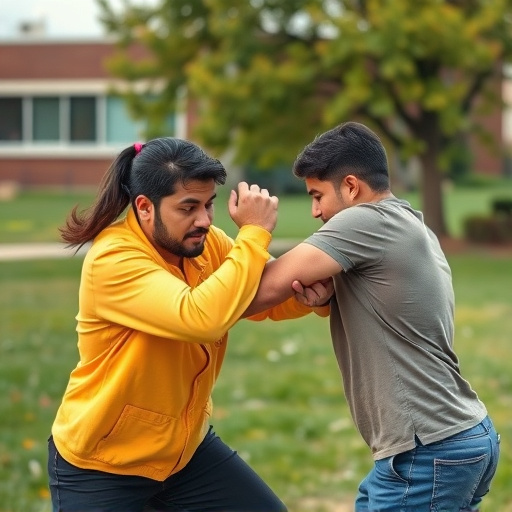Understanding the unique self-defense needs of college students is crucial. With diverse campus life scenarios ranging from crowded dorms to late-night libraries, effective self-defense programs should be efficient and impactful, focusing on essential techniques easily applied in various situations. By fostering awareness and providing practical tools, colleges can empower students to protect themselves while managing busy schedules and unpredictable social landscapes. Key skills include basic martial arts, situational awareness training, and carrying personal safety devices like pepper spray. Students should also familiarize themselves with campus security measures and emergency procedures. Universities often offer specialized programs like Krav Maga or Jiu-Jitsu, workshops on risk assessment, de-escalation, and legal aspects of self-protection. Local community centers and non-profits provide tailored seminars for improved personal safety.
Self-defense is an essential skill for college students, offering vital protection in a new and often unfamiliar environment. This article explores the unique self-defense needs of college students, providing insights into essential skills and strategies to enhance their safety on campus. We delve into resources and training opportunities available, empowering students to navigate potential risks with confidence. Understanding these aspects is crucial for fostering a secure academic experience.
Understanding Self-Defense Needs of College Students
In the dynamic and often unpredictable environment of college campuses, understanding the unique self-defense needs of students is paramount. College life presents a spectrum of scenarios that require varying levels of personal safety. From navigating crowded dormitories to late-night library sessions, students face potential risks that extend beyond traditional classroom settings. Effective self-defense for college students involves equipping them with practical skills and knowledge tailored to these specific challenges.
College students often juggle academic demands, extracurricular activities, and social lives, leaving limited time and energy for comprehensive self-defense training. As such, programs should be designed to be efficient yet impactful, focusing on essential techniques that can be readily applied in various situations. By fostering awareness, providing practical tools, and encouraging proactive safety measures, colleges can empower students to better protect themselves while navigating the diverse and sometimes unpredictable social landscape of higher education.
Essential Skills and Strategies for College Students' Safety
For college students, ensuring personal safety is a top priority, especially in unfamiliar environments. Self-defense goes beyond physical techniques; it’s about empowering individuals with knowledge and strategies to navigate potentially dangerous situations confidently. Essential skills include basic martial arts or self-defense classes, which teach essential moves for neutralizing attackers without causing severe harm. Students should learn to recognize potential threats early, using their instincts as a guiding tool.
Additionally, developing situational awareness is crucial. This involves being mindful of one’s surroundings, knowing escape routes, and identifying safe places on campus. Carrying personal safety devices like pepper spray or alarm keys can also be effective deterrents. Students should familiarize themselves with campus security measures and emergency procedures, ensuring they know how to respond during emergencies.
Resources and Training Opportunities for Self-Defense in the College Setting
College students looking to enhance their personal safety can explore a variety of self-defense resources and training opportunities specific to their campus. Many universities offer specialized programs designed to equip students with practical skills for real-world situations. These can include martial arts classes, such as Krav Maga or Jiu-Jitsu, which teach effective techniques for neutralizing attackers. Some schools also provide workshops on personal safety, risk assessment, and de-escalation strategies, empowering students to make informed decisions in potentially dangerous scenarios.
Additionally, local community centers, gyms, and non-profit organizations often host self-defense seminars tailored for women and other vulnerable populations. These sessions cover a range of topics, from basic physical defense to legal aspects of self-protection, ensuring college students are equipped with the knowledge and tools necessary to navigate potentially threatening situations confidently.
